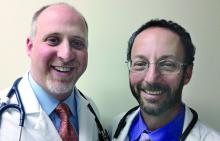I was in Miami recently to give a talk on diabetes when a physician, Pablo Michel, MD, asked me whether we could address an issue that’s important to him and many of his colleagues. His question was, Do we have any suggestions about how to help “older doctors” such as himself deal with electronic health records?
One of the problems with his question was that he didn’t really look “old”; he looked like he was about 50 years of age and in good shape. This physician had come on a Saturday morning to spend 4 hours learning about diabetes, which made it clear that he cared about his patients, his craft, and staying current with the medical literature.
Further discussion revealed that he also was bothered about what he saw happening on many consult notes that he received, as well as the undermining of history and physical notes by copy and paste; the inclusion of a lot of meaningless information made it hard to find information that was relevant. He said that he had become used to doing his old SOAP notes in a really efficient manner and found he was now slogging through mud having to reproduce large parts of the chart in every note that he did.I was struck by his questions, as well as his concern for both the quality of care for his patients and the issues he and his colleagues were facing. And it is not just him. Increased computerization of practices has been listed among the top five causes of physician burnout.1
A recent article in Annals of Internal Medicine showed that physicians spent only a quarter of their total time directly talking with patients and 50% of their time on EHR and other administrative tasks.2 It is likely that, among older physicians, the EHR takes proportionally more time and is an even larger cause of burnout. Given the importance of EHR, it seems time to revisit both the dilemma of, and propose some solutions for, this common problem.
One of the core issues for many older physicians is an inability to type. If you don’t type well, then entering a patient’s history or documenting the assessment and plan is unduly burdensome. Ten years ago, we might have suggested learning to type, which was an unrealistic recommendation then and, fortunately, is unnecessary now.
Now, solutions ranging from medical scribes to voice recognition have become commonplace. Voice recognition technology has advanced incredibly over the past 10 years, so much so that it is used now in our everyday life. The most well-known voice technology in everyday life might be Siri, Apple’s voice technology. It is easy now to dictate texts and to look up information. Similar voice technologies are available with the Amazon Echo and Google Assistant.


